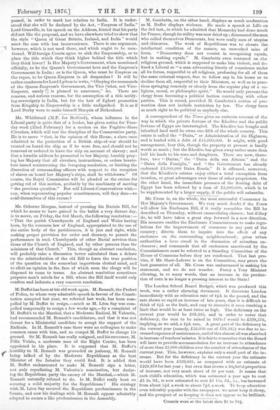M. Gambetta, on the other hand, displays as much moderation
as M. Buffet displays violence. He made a speech at Lille on the 3rd inst., in which he admitted that Monarchy had done much for France, though its utility was now dried up ; denounced the men who called themselves Democrats, but were really men of utopias and chimaeras. The work of Republicans was to elevate the intellectual condition of the masses, an unworked mine of force. "Democracy does not consist in recognising equals, but in making equals." M. Gambetta even ventured on the religious ground, which is supposed to make him violent, and de- fined a Liberal as " a man advocating liberty of conscience under all its forms, respectful to all religions, professing for all of them the same external respect, free to follow any in his home or to decline them all, respectful to their Ministers, as well as to prac- tices springing remotely or closely from the regular play of a re- ligious, moral, or philosophic spirit." He would only prevent the clergy from becoming a political faction contending with other parties. This is sound, provided M. Gambetta's notion of pre- vention does not include restriction by law. The clergy have as much right to be political as anybody else.


































 Previous page
Previous page